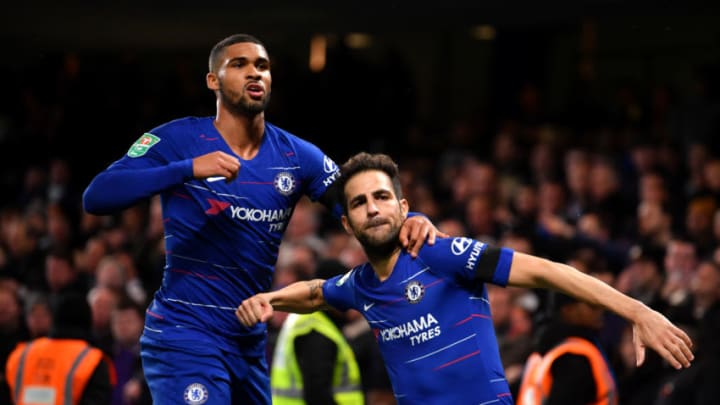Maurizio Sarri hopes David Luiz and Cesc Fabregas will sign contract extensions with Chelsea for one more season. We’re tired of talking about Luiz, so let’s talk about Fabregas.
Cesar Azpilicueta is 29 years, three months and seven days old, which means Chelsea were proud to sign him to a 3.5 year deal that will keep him in Blue until the end of the 2021/22 season. At that point he will be a few months shy of 33 years old.
Cesc Fabregas is already in that vast wasteland of elder-care on the other side of 30 (I can say such things – I’m up in Rob Green territory myself, which sounds so much older than “John Terry territory.” Anyway…). Whatever anyone might think about his level of play or potential contributions to the team, Chelsea will not extend him any more than one year. It’s simply The Chelsea Way, as Maurizio Sarri is learning to his chagrin.
Sarri spoke about the conflict between the club and its players over 30 when it comes time to negotiate. Players obviously want more than single-year extensions, especially players who would still be in high demand for other leagues and teams. But the club are unshakable in this tenet of their business practices.
If Fabregas is looking for a sign from anyone around Stamford Bridge about what he should do, he should take his cue from the club and not his coach.
The club is telling him quite simply, “One year or leave on a free.” Both parties can do basic maths. They knew he would be 32 when this contract ended, which means it was his last multi-year contract. It’s not that players are more disposable when they go over 30 (certainly no more disposable than a Chelsea manager). The club simply does not want to be tethered to a player whose transfer value will decrease every year. Better to let him leave on a free than continue paying him until he leaves on a free a few years later.
A one-year contract undersells what Cesc Fabregas can bring to any team, even Chelsea. Maurizio Sarri knows this, which is why he wants Fabregas to stay, even if for only a year. “[I]t’s very difficult to find a central midfielder technically like Fabregas,” Sarri said in his pre-match press conference.
But Sarri’s intentions for Fabregas also undervalue the Spaniard. A multi-year contract under Maurizio Sarri would simply bind Fabregas to Chelsea’s bench for several more years. Sarri’s compliments towards Fabregas always contain the unspoken phrase “but not as good / not as well / not as much as Jorginho.” Whatever Sarri may think of Fabregas’ capabilities, contributions or rarity as a technically brilliant midfielder, he will always be second to Jorginho in Sarri’s eyes.
Fabregas is not looking for a multi-year paycheck. He is looking for the opportunity to play weekly in a top six league for a few more years, and he knows he could slot into a title challenger with Champions League football in most leagues.
Sarri’s comments on Fabregas and (sigh) David Luiz point to another negative consequence of his role-based concept of players. Sarri has such a narrow view of what each player on the pitch should be that he necessarily restricts his range of options to a handful of individuals.
This creates a false scarcity, which in turn raises the price of the players he has and the players he wants. He may rarely use Cesc Fabregas, but he needs Fabregas to back up Jorginho because the only player more rare than Fabregas is Jorginho himself. Sarri may be coming around to the realities of David Luiz. But because Luiz fits some narrowly-tailored description of a Sarri centre-back, Sarri must tolerate all his deficiencies because Gary Cahill and Andreas Christensen do not fit that description, even if they have a higher defensive aptitude. This ultimately gives Chelsea limited room to maneuver and shop for their replacements. Teams with players who match Sarri’s desires will ratchet up the transfer fees, knowing Chelsea have such a narrow view.
As a result, Maurizio Sarri will push Chelsea to retain players – some old, some young – who are losing productive years of their career on his bench. For a young player, then, a multi-year contract could be a fraught proposition.
The single-year system for players over 30 simplifies matters greatly. Cesc Fabregas has an easy out. Sarri won’t give Fabregas what Fabregas wants: consistent, significant playing time. And Chelsea won’t give Fabregas what he would want under other circumstances: a multi-year contract. So Fabregas can just bide his time and leave when his contract expires to get what he wants.
It is sad to talk so cavalierly about letting a player like Cesc Fabregas go so easily, especially with the thought we will likely be in a similar position someday with Cesar Azpilicueta. The consolation is knowing Fabregas has several good years left, and him playing anywhere will always be better for the game than him not playing, even if that means he is not in Blue.
